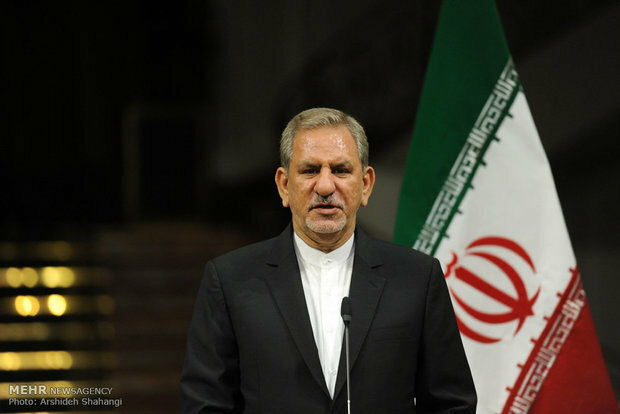First VP: Iran guards Persian Gulf security, stands against bullying

TEHRAN – First Vice President Es’haq Jahangiri said on Tuesday that Iran’s Armed Forces are guarantors of security in the Persian Gulf region, stressing that Tehran will not bow to the big powers’ pressures and bullying.
Iran is honored that it has always stood up to the bullying and maintained status by following international regulations, Jahangiri told reporters in Karaj, a city near Tehran.
He said the Iranians as a civilized nation have always played a leading role throughout history.
The secret behind the Iranian nation’s success was that they have been following a strong logic and dialogue, the vice president noted.
He insisted on the need for dialogue to settle international disputes, saying that the most complicated problems can be resolved through negotiation, while pressure and bullying are irrational.
He referred to recent developments in the Persian Gulf and the wider Middle East region, saying, “We’re keen to have a secure and stable region.”
Jahangiri insisted on the need for dialogue to settle international disputes, saying the most complicated problems can be resolved through negotiation.
Pointing to Iran’s measures to bring tranquility to the region, he said the country has always been guarantor of security in the Persian Gulf region.
Meanwhile, he urged all regional countries to help ensure regional security, adding that the foreigners merely bring insecurity wherever they are deployed.
In relevant remarks on Monday, President Hassan Rouhani described Iran as the guardian of security in the Persian Gulf and the Strait of Hormuz, saying regional issues should be resolved through talks among neighbors.
“Iran has and will be the main guardian of security and freedom of navigation in the Persian Gulf, the Strait of Hormuz and the Sea of Oman during history,” President Rouhani said, emphasizing that the Islamic Republic of Iran is not willing to escalate tensions in the region, and will never initiate war and tension.
Tensions between the U.S. and Iran, never low, have risen considerably since the Trump administration backed out of a 2015 agreement on Tehran’s nuclear program involving Iran, the U.S. UK, France, Germany, Russia and China. In the deal, Iran agreed to reduce its stockpiles of enriched uranium. In exchange, the U.S. and other countries agreed to lift economic sanctions on Iran. However, the U.S. violated the agreement in 2018 and reimposed sanctions on Iran. Iran continued to adhere to the deal until July, when it finally announced it would begin to enrich uranium beyond 3.67 percent allowed under the nuclear agreement.
In the last few months, the friction has only gotten worse. The U.S. increased military deployments in the region after Iran decided to reduce its commitments under the nuclear deal. Iran shot down a U.S. drone flying over its territory in the Persian Gulf on June 20 with a short-range missile. Iranian naval forces also seized a British oil tanker last week for having violated innocent passage rules.
SP/PA
